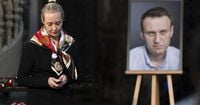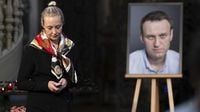On September 17, 2025, Yulia Navalnaya, the widow of the late Russian opposition leader Alexei Navalny, released a video statement that has reignited the controversy surrounding her husband’s sudden death in a remote Arctic penal colony. Navalnaya declared that two independent laboratories, working in separate countries, had analyzed biological samples smuggled out of Russia and reached a stark conclusion: Alexei Navalny was poisoned before he died.
Navalny’s death in February 2024 sent shockwaves through Russia and the international community. As President Vladimir Putin’s most prominent critic and a relentless campaigner against corruption, Navalny was serving a 19-year sentence that he and his supporters always maintained was politically motivated. Russian authorities insisted he died after suddenly falling ill during a walk, citing heart arrhythmia and a combination of other diseases as the cause. Yet, for many—including his widow and a significant portion of the Russian opposition—these explanations never rang true.
According to AFP, Yulia Navalnaya detailed how “biological samples of Alexei” were “obtained and securely transferred abroad.” She explained, “Laboratories in two countries came to the conclusion that Alexei was killed. Specifically: poisoned.” Her remarks, delivered via social media, were as pointed as they were emotional: “I demand that the laboratories that conducted the analyses publish their results.” She continued, “I assert that Vladimir Putin is responsible for the murder of my husband, Alexei Navalny. Stop appeasing Putin for some higher ‘considerations’. You cannot placate him. While you stay silent, he doesn’t stop.”
Navalnaya’s plea was not just for truth, but for transparency. She urged the laboratories involved to release their findings publicly, stating that the results had so far been withheld due to “political considerations.” Although she refrained from disclosing the name of the substance or the labs involved, her call for openness was clear: “I demand that the laboratories that conducted the research publish their results.”
The Russian government, for its part, has remained steadfast in denying any wrongdoing. As reported by The Guardian and The Los Angeles Times, Kremlin spokesperson Dmitry Peskov said he was not aware of Navalnaya’s latest statement and declined to comment further. Russian officials have maintained that Navalny’s death was the result of natural causes, with investigators reportedly informing Navalnaya in August 2024 that her husband died from “a dozen different diseases” and ultimately succumbed to arrhythmia, or an irregular heartbeat. Navalnaya has consistently disputed this account, insisting that her husband exhibited no signs of heart disease while alive.
Navalny’s supporters and many international observers have long suspected foul play. The circumstances of his death—occurring in a remote, high-security penal colony, with his body initially withheld from his family—fueled suspicions. The lack of transparency from Russian authorities and the refusal to release video footage from the prison only deepened doubts. In her video, Navalnaya even showed images purportedly from Navalny’s cell on the day of his death, including vomit on the floor, raising further questions about the official narrative.
Navalny’s death was not the first time he had been targeted. In 2020, he survived a near-fatal poisoning while in Siberia. After falling gravely ill on a domestic flight, he was evacuated to Berlin while still in a coma. There, labs in Germany, France, and Sweden, as well as the Organisation for the Prohibition of Chemical Weapons, confirmed he had been exposed to the Soviet-era Novichok nerve agent—a potent chemical weapon. Russian authorities denied any involvement, a claim Navalny himself publicly challenged after his recovery. Despite the risk, Navalny returned to Russia in 2021, where he was promptly arrested and later sentenced to a lengthy prison term for “extremism.” Even from behind bars, he continued to criticize Putin and the ongoing war in Ukraine, remaining a thorn in the Kremlin’s side until his death.
Navalnaya’s latest statement comes at a time when the Russian opposition is struggling to fill the void left by Navalny’s absence. His charisma, organizational skills, and willingness to confront the Kremlin head-on made him a uniquely formidable figure. As The Independent and BBC have noted, his death left a “vacuum in the opposition movement.” The spontaneous memorials that sprang up across Russia and in cities abroad—flowers, candles, and handwritten notes—were a testament to the impact he had on ordinary Russians yearning for change.
Internationally, Navalny’s death and the subsequent allegations of poisoning have further strained Russia’s relations with Western governments. Leaders such as U.S. President Joe Biden have openly blamed Putin for the opposition leader’s demise, while European officials have called for independent investigations and accountability. Yet, as Navalnaya’s comments highlight, the path to truth remains fraught. Her insistence that the laboratories publish their findings underscores the persistent barriers posed by political sensitivities and the risks faced by those who challenge the Kremlin’s narrative.
The Kremlin’s silence and the laboratories’ reluctance to go public have left many questions unanswered. What substance was used? How was it administered? Who ordered the poisoning? For now, these remain matters of speculation. Navalnaya’s demand for transparency is not just about her husband’s legacy, but about the broader struggle for justice and accountability in Russia. “Stop appeasing Putin for some higher ‘considerations.’ You cannot placate him. While you stay silent, he does not stop,” she said, her words echoing the frustrations of many Russians and international observers alike.
Navalny’s story—his survival of a previous poisoning, his return to Russia despite grave personal risk, his continued activism from prison, and now the fresh allegations of murder—has become emblematic of the dangers faced by those who dare to oppose the Kremlin. As the world waits for the laboratories to release their findings, Navalnaya’s campaign for the truth presses on, undeterred by official denials and political obstacles.
As the dust settles, one thing is clear: the debate over Navalny’s death is far from over. His widow’s call for transparency has reignited demands for answers, ensuring that the circumstances of his passing—and the questions it raises about justice and power in Russia—remain firmly in the global spotlight.



